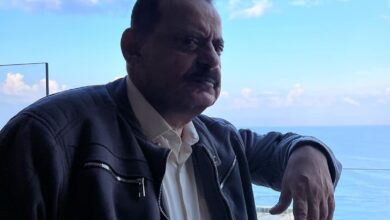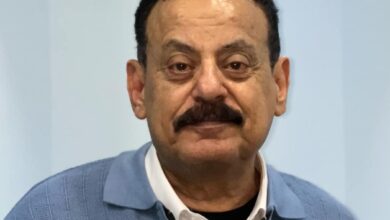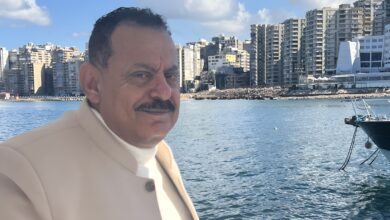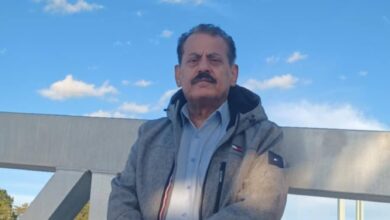Between My Fear and My Madness
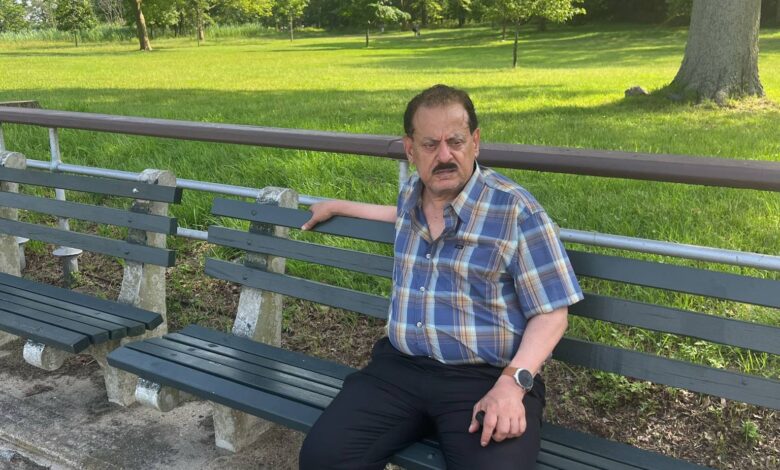
Yemeni mp
Ahmed Saif Hashed
Between my fear and my madness lies a journey of heavy oppression, enduring torment, and a resistance that refuses despair and defeat. It is a space where I grapple with my anguish and my fate, where I assert my existence until it overcomes the shame and dread that have taken hold of me, and the injustice that weighs heavily on my shoulders and those of the ordinary people.
Despite my turmoil and fear, and the stormy scenes that crowd my inner self, I believe I have been sincere in what I express—even if tinged with some confusion. The pain I articulate springs from the depths of my soul, ignited by a restless conscience that does not quiet or yield in the face of injustice, whatever its form, guise, or label.
I have expressed the pains of the people and my own with genuine spontaneity, far removed from the political calculations that often distort the truth, or those that seek to rob consciousness, undermine will, and diminish freedom, working to tame whatever they can within the herd.
When, in 2007, the Deputy Prime Minister for Defense and Security falsely accused me in Parliament of being detained by the political security forces, I swore by my honor that this minister was lying after he finished recounting his fabricated tale. Some members of the assembly demanded that I retract my statement and apologize to his Excellency, while others threatened to revoke my parliamentary immunity for having insulted the minister.
The truth is that I was very honest, while he was very deceitful, intentionally lying and slandering. I refused to apologize, becoming the short wall for my colleagues who leaped to align themselves with the government and his Excellency. On that day, the hypocrisy of some reached a level of shameful and vulgar degradation that weighed heavily on my shattered soul, burdened by their betrayal, hypocrisy, and petty partisanship.
I wrestled with discouraging emotions and crushed the fear that resided within me with a greater resolve and determination to continue my defense and advocacy for the rights of the people and my own violated parliamentary rights. I deeply understood that there was room to transform my psychological hindrance, known as “phobia,” into a strength that surpasses it. Most importantly, I must not yield or succumb to this impediment that seeps into the depths of my soul, which detests injustice and resists oppressors in all their forms and under any banner or sacred pretext
* * *
I felt suffocated by those who feigned sincerity before the cameras to mislead their citizens, lying to them and distorting their awareness. Behind the scenes, in closed rooms, they burden the people with heavy burdens, sacrificing citizens’ rights and perpetrating great injustices, either by colluding with it or conspiring with the wicked to fabricate and present it through a veil of deception, marketing illusions and betraying conscience.
They lifted subsidies on essential goods, passing off burdens under the parliamentary dome with deceptive phrases like “economic reform packages,” without touching or diminishing the pervasive corruption. Instead, they enacted laws to legitimize it, leaving wide gaps for it to pass through like a revered king.
It infuriated me to witness this, and I was even more provoked by those who expertly composed justifications for injustice, or who twisted it into a right cloaked in falsehood, or those who silently colluded with the oppressors in a betrayal steeped in shame. Their crude speeches faded into nothingness, their positions ending in mirages and false burdens—those who accepted bribes after facilitating some hefty deals and enacting laws and agreements riddled with loopholes and horrifying corruption.
I have always been, and still am, troubled by those who lack integrity and conscience, who stand against the interests of the weary poor, the destitute, and their just causes. I often speak with a spontaneity that does not conform to what they call “the art of rhetoric and oratory,” much of which comes at the expense of the nation, justice, and the dreams of those yearning for a greater future filled with abundance, honor, and dignity.
* * *
When I found that the parliament could not accommodate the issues and grievances I carried—realizing that this council was incapable of even addressing the slightest of those concerns, and that it had become too cramped to express what I wished to convey—I became convinced that every struggle within it would not lead to a birth, nor even to a single position capable of overturning the table, changing the situation, or producing even a modest transformation. I eagerly turned to writing, publishing, and engaging in grassroots protest.
I wrote and published reports in newspapers parallel to those of the Freedom and Human Rights Committee in the council, exposing numerous violations I uncovered through my media and human rights activities, driven by a diligent spirit seeking justice, or through the Change Organization, which I was honored to lead.
Through my newspaper, “The Independent,” I revealed what reached my ears that was not publicly disclosed, shedding light on what transpired behind the scenes of the council, the deals being made, and the stances taken in closed rooms. I unveiled the injustices being passed through the council against the people and the nation, as well as the positions and biases of each member, their votes, refusals, and abstentions regarding the important public decisions issued by the council.
* * *
Injustice intensified, and the grievances of the people reached me, or I reached them, accumulating and overwhelming my consciousness and emotions without finding anyone to help me or lift the burdens from their shoulders. Those who presided over the council, whether as president or vice president, treated me with condescension, often ignoring me in ways that provoked my existence, confiscating my right to speak or cutting me off without legal justification or valid reason. At times, they did this with arrogance and disdain, or with cold indifference, thereby exerting control over me through the whims of tyranny and oppression.
I also faced blatant violations directed at me, multiplying as I persisted in demanding justice and resisting oppression, refusing to succumb to it. Colleagues would abandon me after a short time for their own reasons, perhaps seeing me as the short wall upon which they could place their blame, concealing their bias, shortcomings, or weakness. Ultimately, I found no justice or fairness for which I fought with every ounce of strength; I often discovered that power and its agents were repeatedly shielded by their followers in the council, resisting any attempt to reclaim rights or fairness from them.
I protested, staged sit-ins, and rebelled, successfully overcoming much of my shame and fear. My life became filled with attempts, without despair or collapse. I was engaged in confrontations, noise, rebellion, and uproar. What remained paramount was that I would not surrender, be complacent, or yield to any injustice or oppressor.
I undertook many protest actions in the parliament, crushing much of my shame and fear. I progressed from sit-ins to hunger strikes on multiple occasions, to standing on tables, turning my back to the presidency, to chaining myself around my neck and chest until I nearly suffocated, as they tried to prevent me from entering the council chamber to protest. I even resorted to removing my shirt, remaining without it, and at times attempted to close down the parliament alongside the injured, even to the point of undressing multiple times in this very exposed council chamber.
* * *
When oppression unleashes its tyranny and vulgarity upon you, revolt and rebel; do not surrender. It is acceptable to carve out a moment of relief from the crowding and pressure, or to take a warrior’s rest to regain your breath and strength, crushing fatigue and weakness to start anew with an iron will.
When heavy frustration overwhelms you, or calamity descends upon you, or you face a setback in a lopsided battle between the defenseless and those armed with all power, tell fate that the war is not over. Even if we lose a battle, we will have our victories in the future, and we hold great honor. In waiting, there is endurance and patience, and in the end, a great victory awaits us.
If defeat confronts you, say that the one who still resists has not been defeated. It’s acceptable to take a brief respite to recover your strength, to return the blow twofold, and to confront those who have oppressed you with tyranny and injustice. A strong will cannot be defeated by a thousand tyrannies.
I have said, and I continue to say, to those whose oppression has persisted and deepened, believing that their reign will last a thousand years: the age of Sana’a is 12,200 years, and the age of Yemen is deeply rooted in the history of civilization and existence. Even if your time extends in this deep stretch, it will not last more than a fleeting moment. From the momentum of unyielding struggle, we forge our destinies in the face of the oppressive fates they insist on imposing upon us. Assert your existence and do not succumb to the whims of tyranny, nor yield to a reality steeped in injustice, no matter how heavy, dark, or costly it may be.
* * *


